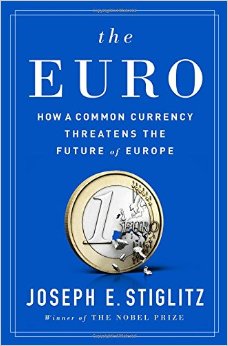Since the onset of the euro zone crisis, two schools of thought have emerged, offering different diagnoses of the single-currency area’s woes. The first focuses on the supply side, namely, the rigidity of labour and product markets in many of the worst-affected eurozone economies.
 The second interpretation blames bad governance for the euro crisis. Without common mechanisms to address macro-economic imbalances, it is argued that the eurozone will be unable to spur investment and growth in many of its member countries.
The second interpretation blames bad governance for the euro crisis. Without common mechanisms to address macro-economic imbalances, it is argued that the eurozone will be unable to spur investment and growth in many of its member countries.
The case made by the Nobel Prize Winner, Stiglitz, sits firmly within the latter school of thought.
In Stiglitz’s view, the acuteness and length of the recession in the single-currency area can be explained by flawed structures – especially the lack of greater risk-pooling among member countries – and a counterproductive policy response.
He argues that so-called austerity, the emphasis on balanced budgets and structural reforms in the countries that have received external assistance – Greece, Ireland, Portugal, Spain and Cyprus – was an ideological choice made by technocrats with little economic backing. Stiglitz further claims that the rules of euro membership, which restrict budget deficits and national debts, have prevented the expansionary fiscal response that was required to restore these countries to health, leading instead to mass unemployment and low growth.
The reasoning behind restricting euro governments’ fiscal autonomy is to ensure that no country would find itself at risk of default, which would compromise its membership of the single currency and thus threaten the integrity of the eurozone itself. This is indeed what happened when member countries, starting with Greece, were revealed to have had consecutive budget deficits well in excess of the three percent limit. As investors began to fret over the likelihood of one or more eurozone departures, the future of the single currency became uncertain.
Yet, Stiglitz gives these arguments short shrift. He entirely overlooks the central role of public authorities in the years before the crisis, exemplified by the Spanish government’s aggressive promotion of home ownership through public banks, the Greek administration’s reckless borrowing to finance the expansion of the public sector payroll, and the dangerous nexus between private banks and the government in Italy. He also fails to consider that, in the early years of the downturn, these same governments attempted to overcome their problems by increasing public expenditure still further. It was only when they lost their ability to borrow at competitive rates in international markets that they changed tack. By this time, some had entered into sovereign rescue programmes.
Stiglitz believes that the eurozone needs centralising reforms – such as the mutualisation of national debts and the introduction of controls on cross-country trade – to overcome its current predicament. Otherwise, he would rather member countries give up the single currency and return to national currencies. It is difficult to imagine governments agreeing to such a transfer of powers and mutual risk sharing at a time of continued economic weakness and increasingly unstable politics.
Moreover, Stiglitz’ proposals would entail the abolition of the central building blocks of the EU, not least the free movement of capital. Those who disagree with Stiglitz’ diagnosis and worry about the implications of his reform agenda can thus draw comfort from the fact that it is unlikely to become a reality in the near future.
This article was originally published by the Institute of Economic Affairs and is reprinted with permission.
(Photo credit: wfabry. This photo has been cropped. CC BY 2.0.)




